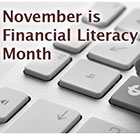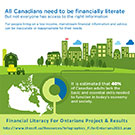|
In this issue:
1) Saving for education – access for all
2) What's New:
i) November is Financial Literacy Month
ii) Financial Literacy Month – Time for Canadian Leadership – and Leadership in Canada
iii) Financial Literacy across Generations
3) Highlights from the Field:
i) Supporting youth in care in their transition to independence
ii) Financial literacy for Ontarians
iii) Meeting the financial literacy needs of newcomers - The Financial Literacy for Newcomers Project
4) Resources:
5) CCFL Blog:
i) The Game Plan – making financial literacy more accessible
6) Poll: Do you know the maximum amount that......
7) SEDI & CCFL News:
i) Focus on Youth - bringing financial literacy to youth in high-need communities
ii) ATTENTION: SEDI Awards date change – MARCH 27, 2014
8) Upcoming Events:
i) November 1, 2013 - Official Launch of FLM 2013 (Ottawa)
ii) November 5-6, 2013 - ABLE Conference (Calgary)
|
|

|
|

|
Saving for education – access for all
Being financially literate, according to the definition adopted by the Task Force on Financial Literacy, is “having the knowledge, skills and confidence to make responsible financial decisions.” With the school year already in full swing, the pursuit of knowledge in an academic sense, occupies the minds of many parents – How will my child fare this year at school? What does the future hold for my child academically?
The cost of education has real implications for Canadians living on low-incomes. With the average student graduating with $26,000 in debt ($35,000 in B.C.), middle- and upper-income parents are doing what they can to ease the financial burden for their children by investing in Registered Education Savings Plans (RESPs). An RESP is a special savings account that can help Canadians save early for their child’s post-secondary education. The Government of Canada has two financial incentives for Canadians to save in RESPs: The Canada Learning Bond (CLB), where families can get up to $2,000 for their child's RESP —without having to put in any of their own money, and the Canada Education Savings Grant (CESG), where families can receive up to $7,200 from the Government of Canada to help pay for their child’s education after high school.
For many Canadians living on low incomes however, finding extra money to put away for their child’s post-secondary education can be difficult, if not impossible. Many hope their children will aspire to higher education, but are keenly aware of the financial barriers that often prevent them from pursuing further studies once they leave high school.Low financial literacy may also prevent some parents with low incomes from accessing certain government benefits or programs that could help their children to save for post-secondary education, simply because they don’t know about them.
In 2008, research conducted by the Omega Foundation revealed that families with high incomes were taking advantage of Canada’s programs to encourage education savings at four times the rate of families with low incomes. Only 16 per cent of families in the low-income bracket had taken advantage of the Canada Learning Bond to help start an RESP for their child. In response to these findings, the Foundation embarked on a very successful three-year project called SmartSAVER to address this issue.
SmartSAVER engaged almost 1,000 service providers in the Toronto area and included partnerships with the City of Toronto, the Toronto District School Board and the federal government. The program provided families with information on RESPs and the Canada Learning Bond, as well as help accessing these savings supports through community clinics.
Fast forward to 2013 and the situation has improved markedly. A March 2013 report outlining the impact of the SmartSAVER program, shows that the uptake of the Canada Learning Bond in Toronto increased from 27.7 per cent of eligible children at the end of 2009 to 39.3 per cent at the end of 2012.
The challenge moving forward will be to continue the momentum and to broaden the impact into other regions. To view the percentage of eligible children receiving their Canada Learning Bond in your province, click here.
Resources to share broadly
The Omega Foundation has created a website for parents and community organizations (http://community.smartsaver.org/learn-more.shtml). The website contains many valuable resources to help promote access to education savings supports in communities across the country, including an online workshop that offers basic training in RESPs and the Canada Learning Bond. The training reveals some interesting statistics, including the fact that youth with savings are almost 50 per cent more likely to attend a post-secondary school and that children from low-income families are less likely to attend a post-secondary school, even if they have excellent grades and their parents think education is a priority.
The following RESP resources can also be found on the Employment and Social Development Canada website:
For an academic perspective on access to post-secondary education by low income families, the 2011 Higher Education Quality Council of Ontario conference released a number of reports coming out of its Fear of Finance: Financial Literacy and Planning for Post-Secondary Education conference. This conference brought together leading researchers to discuss their work in educational financial literacy, with many focusing on the issues and data unique to low-income families.
We know from research that education levels are a key determinant of an individual’s employment prospects and their future earning potential. Programs that assist families with low incomes to finance their children’s education, can only improve the potential of those children for future financial success. Access to information and increased awareness around RESPs and programs like the Canada Learning Bond are vital to children from families with low incomes.
To understand the importance of RESPs from the student’s perspective, we recommend reading the article, Two-thirds of Canadian university students have no RESP: survey, recently featured on canada.com.
Help spread the word!
The Canada Education Savings Program has developed a network of community organizations interested in promoting the Canada Learning Bond to low income Canadians. If you are interested in participating in this network and getting access to additional promotional resources you can request to participate by registering for a password here: www.cibletudespro-canlearnpro.ca
Sources:
OMEGA website - www.theomegafoundation.ca
HRSDC website - www.hrsdc.gc.ca/eng/home.shtml
SmartSAVER - www.smartsaver.org
Higher Education Quality Council of Ontario - www.heqco.ca/en-CA/Pages/Home.aspx
Globe and Mail – September 6, 2013 - www.theglobeandmail.com/commentary/another-day-smarter-but-deeper-in-debt/article14157421/
Top
|
|
What's New

|

|
November is Financial Literacy Month
Help build awareness of the importance of financial literacy. During FLM, the Financial Consumer Agency of Canada (FCAC) is encouraging everyone to organize activities to help Canadians become more financially literate, and raise awareness of the many resources available to help them reach their financial goals.
We encourage you to visit FCAC’s website to learn more and to register your event in their FLM calendar.
Top

|
|
|
Financial Literacy Month – Time for Canadian Leadership – and Leadership in Canada
We live in challenging financial times – times offering opportunity to some – and significant stress for many others.
Read more
Top

|
|

|
Financial Literacy across Generations
As part of Financial Literacy Month (FLM) starting on November 1, the Financial Consumer Agency of Canada (FCAC) announced its second annual video contest today. With the theme "Financial Literacy across Generations" the contest invites young Canadians aged 13 to 19 (as of November 30, 2013) to submit a 30-second to 2-minute video…
Read more
Top
|
|
|
Highlights from the field

|
|

|
Supporting youth in care in their transition to independence
When making the transition from childhood to adulthood and independence, youth in care face unique challenges that most other young people do not. Emotional, educational and financial supports top the list of things youth in care need the most. *
In response to this need, SEDI partnered with the Children’s Aid Society of Toronto (CAST) and Toronto Catholic Children’s Aid Society (CCAS) in 2011, to test a program model for providing financial literacy education to up to 300 youth in care and a complementary incentivized savings program for 20 youth in care.
Funded by a Vital Ideas Award from the Toronto Community Foundation, the Opportunities Account for Youth in Care (OAYC) project sought to:
-
Test whether teaching youth in care about money management and providing incentivized savings would improve their financial knowledge, skills and behaviour.
-
Identify an effective model for teaching financial literacy to youth in care.
Promising results
SEDI’s findings released this summer show the effectiveness of equipping youth in care with the financial education and support they need to successfully transition to independence. Youth participating in the incentivized component of the project:
-
Reported that they had a positive and supportive experience.
-
Demonstrated improved money-related knowledge and skills development.
-
Increased their savings and productive assets.
Together, youth in the incentivized savings group in the project earned nearly $16,000 in matched savings to use towards rent, education, and/or employment and education supports.
Consider the impact of program delivery on front-line staff
The project also identified an important learning for SEDI – namely that we need to explore alternative delivery approaches for the financial education component of the program, rather than Children’s Aid Society workers themselves – both to avoid adding to case workers’ already heavy workload and to deliver education in ways that are seen as engaging by youth themselves, such as social media or web-based games and videos. These need to complement the other efforts of staff, however, to support youth in planning and preparing for their transition to independence.
SEDI is now actively exploring new and interactive technologies for the delivery of financial information to youth in care, in ways that complement youth learning styles and case worker-youth interactions.
Read more about the findings from the OAYC project.
* Ontario Association of Children’s Aid Societies. Youth Leaving Care: An OACAS Survey of Youth and Staff. Toronto, April 2006. Web. 10 Apr. 2013.
Top

|

|
Financial literacy for Ontarians
With funding from the Ontario Trillium Foundation, the Canadian Centre for Financial Literacy (CCFL) worked with community organizations across Ontario from 2009-2013 to enhance local delivery of financial literacy programs in Northern Ontario and rural and remote communities. The organizations we partnered with served many different populations, including women, newcomers, Aboriginal peoples, families and youth.
We are pleased to share some of the project results and the tremendous impact this project continues to have after wrapping up this summer:
-
We held 18 facilitator training sessions for organizations from 46 urban, rural, remote, and northern communities throughout Ontario. These sessions provided 295 staff and volunteers at 128 community-based organizations with training as financial literacy educators, substantially increasing the capacity of Ontario communities to provide financial literacy supports to vulnerable populations.
-
Three thousand one hundred and eight low-income Ontarians accessed financial literacy education and information workshops as a result of this project, and many more participants received one-on-one financial literacy supports. Participants and facilitators reported significant positive changes in participants’ knowledge, attitude, and behaviours as a result of the financial literacy education and support they received, and these changes continued in effect over the year following the training.
-
Many organizations adapted the financial literacy materials provided to work more effectively in their particular contexts, devising workshops or working one-on-one. Our resources are still being used in many organizations and continue to be integrated into programs, consultations, and workshops after the completion of the project.
-
Community partnerships have been established and/or enhanced through the project in order to continue delivering financial literacy education and supports in many Ontario communities.
On completion of the project, the CCFL created three videos to demonstrate how some of our partner organizations have integrated the financial literacy training they received into their programs and services.
We would like to thank all of the organizations that partnered with us on this project and who continue to deliver financial literacy workshops to support the financial inclusion of Ontarians. Our thanks go as well to the Ontario Trillium Foundation for its generous funding and support for this important project.
View the Infographic
Watch videos featuring our project partners:
Yes Employment Services
Northern Ontario Youth Entrepreneurship Initiative
PARO Centre for Women’s Enterprise
Top

|

|
Meeting the financial literacy needs of newcomers - The Financial Literacy for Newcomers Project
The CCFL has been building its capacity to address the financial education needs of newcomers to Canada for several years and has made some significant strides in this area. In 2009, as a follow-up to SEDI’s 2008 report Financial Literacy: Resources for Newcomers to Canada, the CCFL trained front-line settlement agency staff to deliver financial education workshops to newcomers with funding from Citizenship and Immigration Canada (CIC). This project, the Financial Literacy for Newcomers Project (FLNP), aimed to increase newcomers’ financial literacy during their initial settlement period, thereby increasing the likelihood that they would enjoy a more rapid, successful, and sustainable integration into Canadian life.
The evaluation report for FLNP wrapped up in May 2011 with positive results. Consequently, a second phase of FLNP was proposed with an overarching goal of enabling 375 newcomers to integrate into society more quickly by:
-
Providing timely, useful and accurate financial information to support newcomers in their settlement decisions.
-
Increasing their understanding of life in Canada including laws, rights, responsibilities and how to access community resources.
-
Building a community of practice in order to support more organizations to include financial literacy programs as part of the services offered to newcomers.
Results
The CCFL exceeded all of its objectives for Phase 2 of the FLNP. One particularly valuable outcome of the project was the development and piloting of a groundbreaking, online Newcomer Financial Information Tool, designed to enable settlement workers to deliver tailored financial education supports to their clients.
The CCFL is committed to expanding its newcomer financial education work and has recently been funded to embark on Phase 3 of its FLNP. This will focus on supporting 1,125 newcomers to integrate into society more quickly through financial literacy supports and services and include the following components:
-
Growing the scope and scale of CCFL’s facilitator-training model.
-
Tailoring our educational products to make them more accessible and relevant to newcomers.
-
Developing new online tools that can be directly accessed by newcomers to Canada.
-
Conducting research that can help us improve financial literacy supports for settlement workers.
For more information on CCFL’s work with newcomers, please contact Christina Sackeyfio.
Top
|
|
|
Resources

|
|
|
|
CCFL Blog

|
|
|
|
|
Poll

|
|
|
|
SEDI & CCFL News

|
 |
Focus on Youth - bringing financial literacy to youth in high-need communities
This September, 700 high-school students from across Toronto returned to the classroom better prepared to plan financially for their futures.
The students were participants in the Focus on Youth program, a partnership between the Ontario government, school boards and community agencies that provide summer programs for young people living in high-need communities. The Toronto youth—students from the Toronto District and Catholic District School Boards—earned the chance to gain valuable work experience at local community organizations. In preparation for the program, the youth went through intensive orientation and leadership workshops, including financial literacy training.
The United Way of Toronto was a key partner in delivering financial literacy training to the youth. The United Way, in turn, drew on the help of a large network of facilitators and volunteers committed to supporting youth financial education. Organizations that helped design and deliver the program included: Credit Canada; the Financial Advocacy and Problem Solving (FAPS) programs at St. Christopher House, Jane-Finch Community and Family Centre, and Agincourt Community Services Association; the University of Toronto Centre for Community Partnerships; the York University-TD Community Engagement Centre; and the Canadian Centre for Financial Literacy at SEDI.
During their training, students were invited to take part in the Amazing Race of Money, an interactive game originally designed by staff at North York Community House and modified for the Focus on Youth program. During the game, teams took on tasks at 15 different stations. Activities such as the Understanding Your Paycheque matching game, the Fraud/Identity Theft Wheel of Fortune, and the Frosh Week Puzzle tested the students’ knowledge, while providing much-needed information to help them build their financial health. Participating teams were scored on effort and their correct responses upon completion of each task. The team with the highest tallied score won.
No youth left empty-handed. Each participant was given a “swag bag” containing unbiased financial information, stationery items and apparel from the Comedy Network. Five lucky students also won a draw for iPod Minis.
Overall, it was a great start to the summer and, hopefully, a memorable way to share financial information with the youth participants at the Focus on Youth program.
Top

|
|



|
ATTENTION: SEDI Awards date change – MARCH 27, 2014
Get inspired by remarkable individuals making a difference to expand economic opportunity for Canadians living in poverty. Come celebrate with us on March 27, 2014 as we honour SEDI’s Award recipients (formerly scheduled for November 18, 2013). In response to a number of our valued supporters, we moved the date to ensure we can share the occasion with as many of our stakeholders as possible. The new date also provides an exciting opportunity for SEDI to unveil its new brand!
The SEDI Awards Gala Dinner brings together more than 400 community, business and government leaders to celebrate the extraordinary achievements of SEDI's many partners and program participants in expanding economic opportunity for low-income Canadians.
Join us and hear inspiring stories of Award nominees and winners who are helping to make Canada a place where everyone has lifelong opportunities to improve their social and economic well-being.
Our Keynote Speaker this year is Robert (Bob) Friedman, General Counsel, Founder and Chair of the Washington-based Corporation for Enterprise Development (CFED).
Bob will be speaking about the dramatic changes underway in US cities that have introduced successful city-wide strategies and programs to financially educate and empower their low- and modest-income residents and the opportunities for similar breakthrough innovation in Canada.
CBC Television anchor, Suhana Meharchand, will also be returning as our emcee.
Tickets: $350 each
Table (10 seats): $3,000
Register Now
Support SEDI
Your support for the 2013 SEDI Awards will help us continue our work with business, government, and community partners across Canada to expand economic opportunity for Canadians living in poverty.
Learn about our sponsorship opportunities
Donate now
Top
|
|
|
Upcoming Events

|
|

|
November 1, 2013 - Official Launch of FLM 2013 (Ottawa)
Under the theme “Financial Literacy across Generations,” the FLM 2013 national launch will feature a speech by renowned author and financial planner David Chilton, followed by a panel discussion during which experts will explain how the activities of financial literacy networks in Canada help improve the financial literacy of Canadians across generations.
To attend the national launch, please register by contacting: flm@fcac.gc.ca.
This event is free and space is limited!

November 5-6, 2013 - ABLE Conference (Calgary)
ABLE is a national conference for all stakeholders interested in fostering financial empowerment for people who live on low incomes. This year’s conference will feature a range of innovative financial empowerment initiatives, a closer look at the role of financial institutions and emerging research and policy.
Read More
Top
|
|

|
Contact Us
60 St. Clair Avenue East, Suite 700, Toronto, Ontario M4T 1N5 Tel: 416-665-2828 Toll free: 1-877-568-1571
To sign up for this e-newsletter or to unsubscribe, please send an e-mail to info@sedi.org.
|
|
|